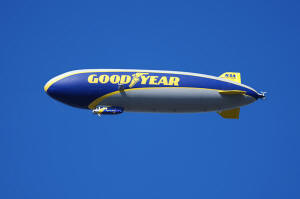The iconic Goodyear Blimp is 100. To celebrate, a flight over Ohio
[June 03, 2025]
By BRUCE SHIPKOWSKI
The iconic Goodyear airships are taking a victory lap over the skies of
an Ohio city this week.
The Akron-based tire company is celebrating the 100th anniversary of
“Pilgrim,” its first blimp to take flight just outside of the city on
June 3, 1925.
Goodyear began experimenting with vessels that would be lighter than
aircraft in the early 1900s, and the dirigibles have since become a
lasting and iconic symbol of the corporate brand. For some, it evokes
nostalgia, while for others it offers a glimpse into a larger-than-life
part of advertisement history.
Here is a by-the-numbers look at Goodyear airships over time:
1910
Goodyear establishes an Aeronautics Department to build lighter-than-air
aircrafts, and by 1912 the company had built its first balloon.
In 1930, the “Defender” blimp became the first airship in the world to
carry a lit neon sign so the company’s name could be seen after dark.
Goodyear began making airships for the U.S. Navy in 1917, and its first
blimp — the first commercial non-rigid airship flown using helium —
launched years later, becoming a marketing tool.
From 1942 to 1944, the company built more than 150 airships for the Navy
to serve in World War II, flying patrol over warships on the seas with
zero reported loss of ships when a blimp was on watch.

New Year’s Day 1955
The Goodyear Blimp has been a regular at major sporting events since
flying above the 1955 Rose Bowl. A few years later, it became a service
vehicle for television coverage while simultaneously functioning as a
highly visible advertising platform.
Since that time, blimps have undergone wholesale changes and improved
dramatically: steering technology; safety innovations; high-definition
cameras; aerial views captured with specialized systems that compensate
for movement during filming, resulting in stable and smooth footage
footage; and much quieter rides thanks to relocated engines and
propellers.
4 blimps
There currently are four Goodyear Blimps — the three in the U.S. and one
in Friedrichshafen, Germany.
[to top of second column]
|

A Goodyear blimp flies over Michigan Stadium in the first half of an
NCAA college football game between Michigan and Southern California
in Ann Arbor, Mich., Saturday, Sept. 21, 2024. (AP Photo/Paul Sancya,
File)

Today’s Goodyear Blimps are semi-rigid dirigibles, meaning they have
an internal frame as compared to previous eras of blimps that could
be fully deflated. In 2014, Goodyear transitioned to the New
Technology semi-rigid airship platform designed to allow for
improved maneuverability and speed.
246 feet
The Goodyear Blimp is 246 feet long (75 meters), which would cover
about 80% of a football field. It is 58 feet (18 meters) high and
holds three Olympic-sized swimming pools' worth of helium.
Goodyear gets helium for its blimps from multiple sources. Because
helium is a finite resource, the company purifies its helium every
six to eight weeks to extend its life.
The blimp travels more than 100 days per year, with trips ranging
anywhere from three days to three weeks. A crew of nearly 20 people
travel with the airship whenever it is touring. Today’s Goodyear
Blimps fly between 1,000 and 1,500 feet (305 meters and 457 meters)
in the air and travel at speeds up to 73 miles per hour (117
kilometers per hour).
10 blimp pilots
There currently are fewer blimp pilots in the world than astronauts,
according to Goodyear, which has 10 full-time pilots. To serve in
that job, you must have a commercial pilot license followed by
approximately 250 hours of training to earn an additional
lighter-than-air airship rating from the Federal Aviation
Administration.
2,500 and 500,000
The blimp has covered more than 2,500 events and taken more than
500,000 passengers for rides, according to Goodyear. Former
President Ronald Reagan might be the most famous passenger, but it
was rapper Ice Cube who raised the blimp’s street cred when he
included a line about it in his 1992 song titled “It Was A Good
Day.”
All contents © copyright 2025 Associated Press. All rights reserved
 |